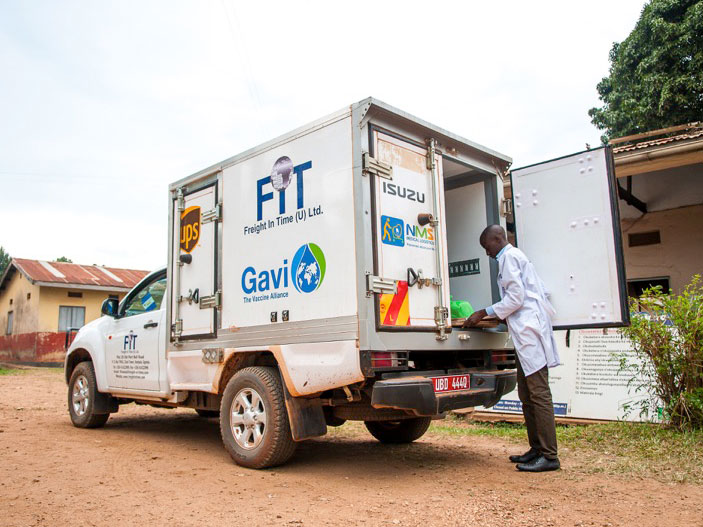To expand innovative last mile delivery network and bring essential vaccines to children in hardest to reach communities
The UPS Foundation, which leads the global citizenship programs for UPS (NYSE: UPS), and Gavi, the Vaccine Alliance, announced today a commitment of US$3 million in new funding and in-kind logistics support spanning two years, provided by UPS and The UPS Foundation to Gavi. The new support will enable Gavi to continue to strengthen supply chain networks that deliver life-saving vaccines to children in the world’s poorest countries, and expand coverage of essential childhood vaccines with the mission of eliminating childhood deaths from avoidable diseases.

This commitment extends The UPS Foundation’s and UPS’s long-time partnership with Gavi and draws on the company’s deep expertise in healthcare supply chain management. The UPS Foundation’s corporate partnership with Gavi began in 2014. Since that time, UPS has provided funding and technical expertise aimed at establishing reliable cold chain networks, expanding last mile delivery of vaccines, broadening the pool of trained supply chain managers in priority countries and spearheading innovation.
“Strong and efficient supply chains are essential to Gavi’s work,” said Dr. Seth Berkley, CEO of Gavi. “With support from The UPS Foundation, we have in recent years been able to greatly enlarge and improve supply chains that Gavi-eligible countries rely on to deliver vaccines, even in some of the most remote areas of the world. We’re extremely grateful to The UPS Foundation, whose close partnership with Gavi has yielded truly groundbreaking accomplishments. We’re excited to move ahead with the next chapter of this enormously fruitful relationship.”
“As a purpose-driven, global organization, our support for Gavi’s mission can help advance our society in the most important way – our children’s future – and catalyze more private sector support,” said Eduardo Martinez, President of The UPS Foundation and UPS Chief Diversity & Inclusion Officer. “We aspire to create pathways for the public sector and civil society to better connect with the private sector, to create more efficient systems, and enable innovations that improve the delivery of vital health services and commodities like vaccines.”
With the support of the Ugandan government and Minister of Health, in July 2018, UPS and Gavi developed a pilot last mile vaccine delivery network in three districts around Kampala, Uganda, serving three million people and focused on improving the percentage of Ugandan children who receive childhood vaccines. Working with the Ugandan Ministry of Health, UPS, Gavi and UPS’s authorized service contractor established a vaccine delivery system reaching more than 150 clinics. The pilot, which was well received by local health networks, utilized cold chain best practices, vehicles with refrigerators, temperature monitoring tools, stock management systems to track inventory and trigger ordering before vaccines are out of stock.
The UPS Foundation’s contributions have supported, among other activities, the Strategic Training Executive Program (STEP) Leadership Development program, which builds supply chain managers’ capacity to provide end-to-end management of vaccine supply chains.
This new contribution from The UPS Foundation, combined with the Gavi Matching Fund, will be used to support Gavi’s supply chain initiatives across the 2021-2025 period, strengthening the Alliance’s capacity to engage with the private sector and replicate the successful Uganda model to exponentially increase availability of vaccines for children in other countries.








